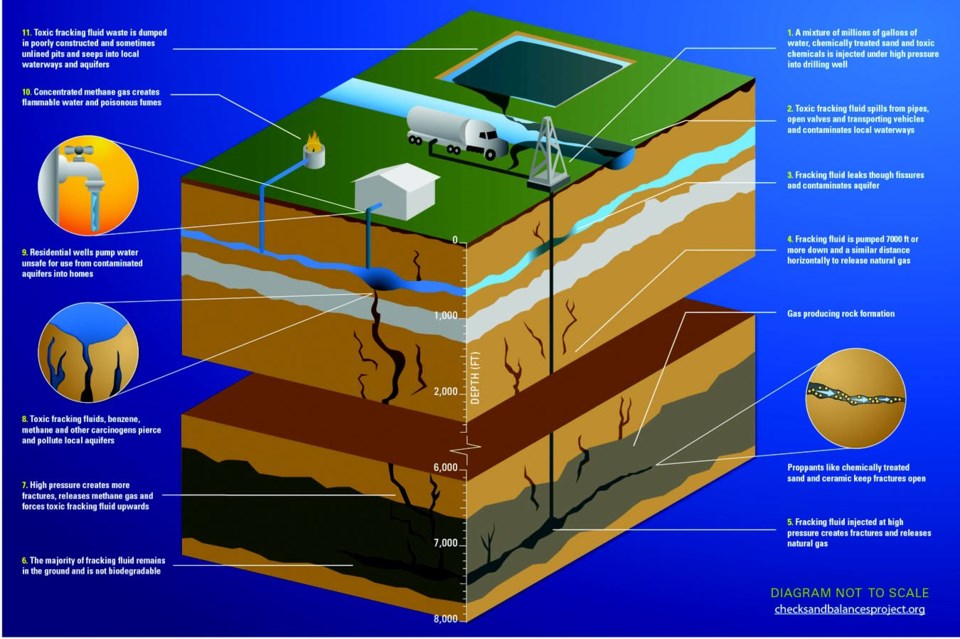The Fraser Basin Council will be investigating the human health risks associated with oil and gas development in Northeast B.C.
The organization will be conducting the first of a three-phase investigation on behalf of the B.C. Ministry of Health. Phase one will focus on public consultation and identification of health concerns.
Fraser Basin Council executive director David Marshall said he expects the controversial practice of hydraulic fracturing, or fracking, will be one of the major issues raised during the consultation process.
"[We expect] issues like the quantity of water used, the chemicals used and groundwater impacts. Also air quality issues. As long as it has some relation to human health, it's fair game," Marshall said. "We're really please to be asked to help the Ministry of Health on this. We're an impartial organization."
The Fraser Basin Council is a nonprofit society which was formed in 1997 to advance social and environmental sustainability in the Fraser River basin. The Ministry of Health is paying the council $100,000 to conduct the consultation work.
Marshall said the Fraser Basin Council will announced details of how Peace country residents and stakeholder groups can take part in the coming weeks.
However, he said, there will be a website, e-mail address, mail address and toll-free phone number the general public will be able to use to provide their feedback. In addition, Marshall and other members of the consultation team will meet with stakeholder groups in communities including Chetwynd, Dawson Creek, Fort St. John and Fort Nelson starting in late January and into February.
"[But] it's going to be very targeted meetings with the public - we will not have open public forums," he said.
Marshall said he expects to hear from health professionals, academics, nonprofit organizations, First Nations, industry representatives and government on the issue.
The Fraser Basin Council has until March 31 to complete a report to the Ministry of Health. The report will be used to shape phase two of the investigation - a scientific review of information related to the concerns raised by phase one.
Phase three of the process will be a report to government, stakeholders and the public.
In a written statement Peace River South MLA Blair Lekstrom said the study should address ongoing concerns about fracking in the Peace.
"As the local MLA for the region I've heard this concern in the past, and. while I'm confident that the process is a safe one, this study will let us know if something does need to be changed," Lekstrom said. "The majority of the people who live in the region support the oil and gas industry and are looking for information that ensures the health and safety for themselves and their families."
About fracking time: Sierra Club
In November the Sierra Club of Canada called on the federal and provincial governments to impose a moratorium on fracking by the natural gas industry until regulations are put in place to ensure public safety and protection of drinking water supplies.
Fracking forces pressurized liquid down a well to fracture rock layers - releasing natural gas, oil or coal seam gas trapped in the rock.
Sierra Club executive director John Bennett applauded the B.C. government for taking action on the issue.
"The reason we called for a moratorium is it needs more investigation," Bennett said. "We think this is overdue and congratulate them for taking a breath to pause and look at this."
Bennett said the chemicals used in the fracking process have been linked to contaminated well water in parts of the U.S.
"We're seeing new reports from the [Environmental Protection Agency] in the U.S. that wells are being contaminated," Bennett said. "We know at least 13 of the chemicals used are toxic, plus many more are unassessed."
In December, the U.S. Environmental Protection Agency released a report linking natural gas fracking to benzene and 2 butoxyethanol contamination in well water in central Wyoming.
"We're strong supporters of the use of natural gas to get off oil and coal, but not at the expense of people getting sick," Bennett said. "Really the federal government should be working with the provinces to develop some national standards. This is not going to be a northeast B.C. problem, it's a national problem."
The impact of drilling and fracking large numbers of wells very close together hasn't be adequately examined, he added.
"We need to know what the impact is going to be," he said. "Things don't always work the way people think they should."
In Blackpool, England a pair of tremors registering up to 2.3 on the Richter Scale were deemed to be "likely caused" by fracking operations, according to a report released by Cuadrilla Resources in November.
Industry responds
Canadian Society for Unconventional Resources president Mike Dawson said he hopes the study dispels rumours about fracking. The society was formed in 2002 to represent and promote the unconventional natural gas sector.
"One of the challenges is ... there is a quite a bit of misinformation out there," Dawson said. "The B.C. government is taking a very staged, and cautious approach which we appreciate. I think it's a positive move as long as the processes are well thought out and based on science."
Dawson said fracking has been used successfully in B.C. and Canada for years.
"Over 167,000 wells have been hydraulically fractured in Alberta ... [and] 173,000 in Western Canada," Dawson said. "We've been doing it successfully in the Peace country for number of years.
The Peace country ... is a very significant part of providing gas to Canada, for domestic use and export. It's an important part of the Canadian economy."



